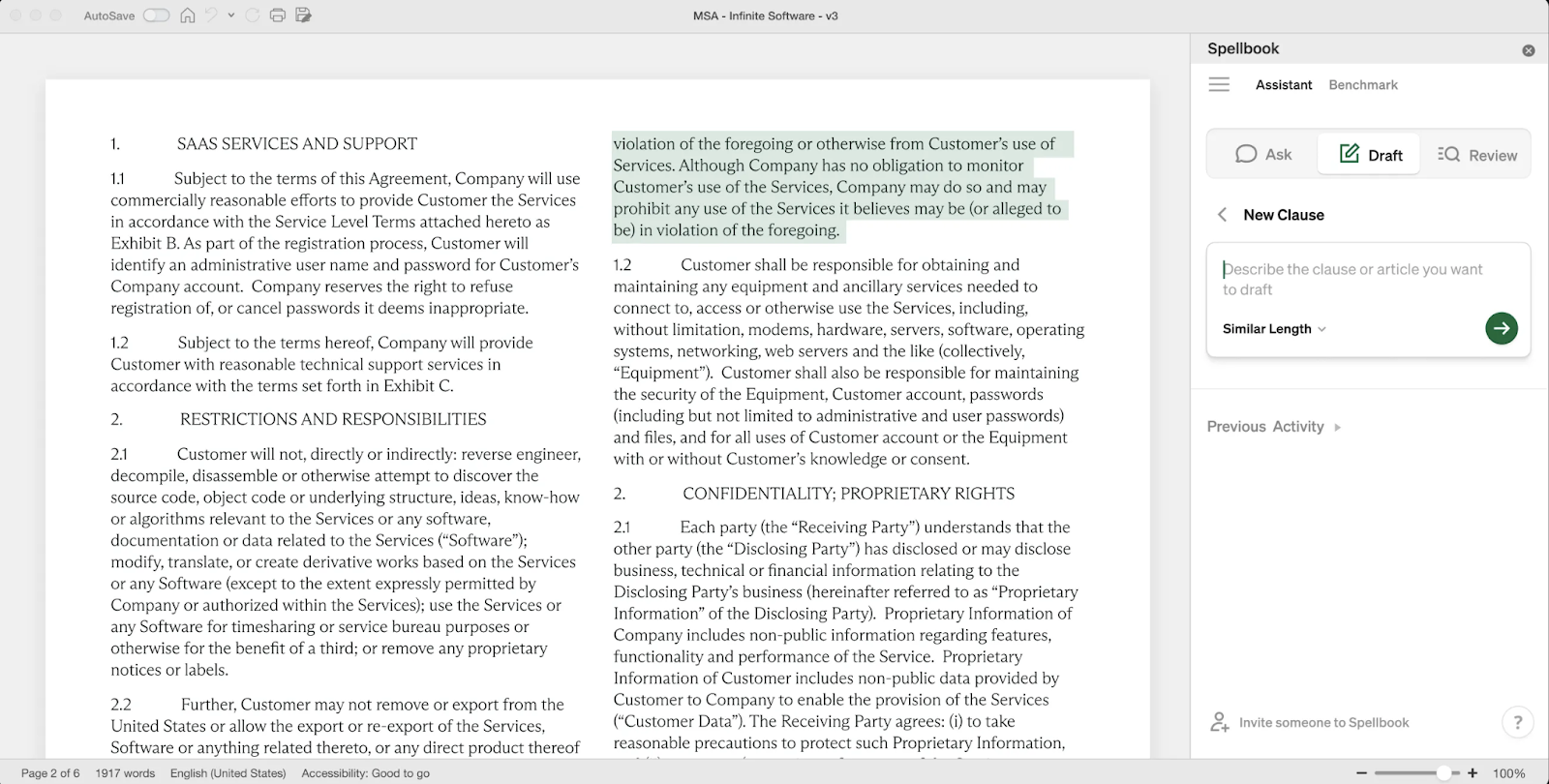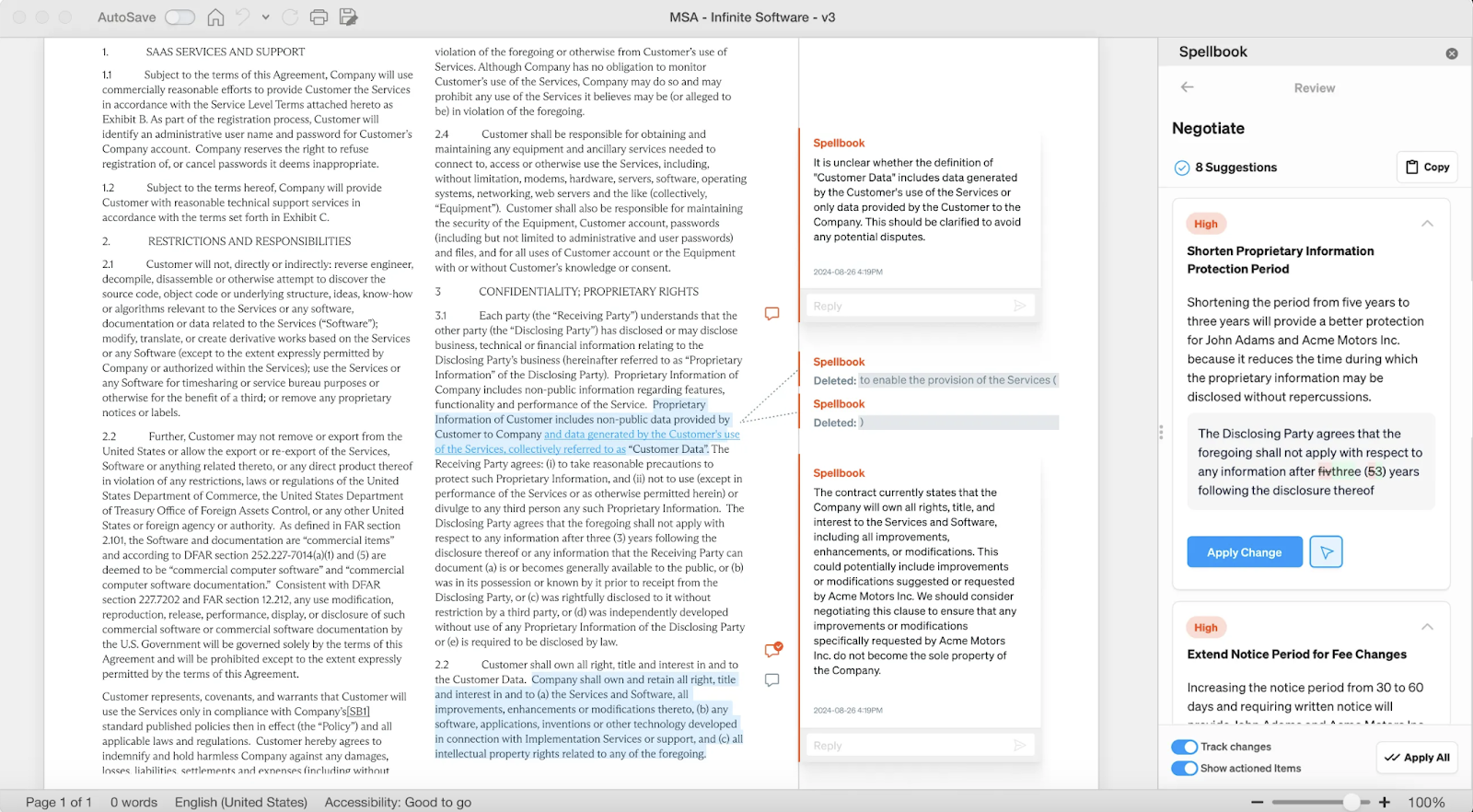
Generative AI in Legal Contracts: Bridging Gaps Between Technology and Law

Finalizing a high-stakes contract in a few hours without compromising on compliance, clarity, or control is no longer wishful thinking, thanks to generative AI for contracts.
A new class of language models is bridging the long-standing divide between technology and the legal profession. Now, lawyers can automate, draft, review, and optimize contracts faster and more accurately than ever before.
Here’s how generative AI is transforming the contract lifecycle and why it’s a strategic asset for every business, organization, and legal team.
Key Features of Generative AI for Contracts
Faster drafts, more precise reviews, fewer errors. A KPMG study found that AI-based contract interpretation and summaries reached 98% accuracy, outperforming human analysis, which averaged 92%.
What makes generative AI such a powerful tool for legal teams?
Generative AI for contracts is trained on massive sets of legal documents, allowing it to identify legal language patterns, interpret nuanced legal concepts, and understand complex legal requirements with remarkable precision.
Let’s break down how these systems work.
{{cta-surprise-red}}
AI-Powered Contract Drafting
Gone are the days of starting from a blank document. Today’s generative AI tools can automatically generate legal documents tailored to the contract type, applicable jurisdiction, and relevant industry standards. You get suggested clauses, structured formatting, and key terms that reduce drafting time while improving thoroughness and accuracy.
Advanced tools accelerate contract negotiation by creating initial drafts based on a pre-approved playbook or template, which reduces the back-and-forth review and revision process to boost efficiency. Lawyers can customize contract templates to meet the requirements of different jurisdictions, making global compliance easier than ever.
Smart Clause Generation
Generative AI isn’t a ‘copy and paste’ model. It understands the context of the business deal or legal setting and recommends tailored language for contracts. Lawyers receive context-aware clause suggestions that align with contract type, party roles, and jurisdiction, helping them draft more efficiently without sacrificing legal precision.
Real-Time Contract Review with AI Assistance
Advanced legal AI tools can automate contract analysis, identifying errors and hidden risks that could lead to negotiation delays or potential legal issues. Platforms like Spellbook suggest edits and help improve accuracy in contract terms to ensure that contracts are airtight. Legal professionals save hours in review, especially in high-volume contract cycles.
A Deloitte study found that 88% of legal teams reported productivity and efficiency gains with generative AI, with 78% saying AI had the greatest impact on document review and summarization. This demonstrates how generative AI is transforming contract review into a faster and more strategic legal advantage for your team.
AI-Powered Compliance and Legal Language Optimization
Compliance is non-negotiable in legal practice. AI tools can analyze a contract against playbooks to ensure adherence to local, federal, or international regulations. This helps you identify and amend areas where a document may fall short.
Generative legal AI platforms also optimize legal documents by simplifying complex language into clear, concise terms. This enhances readability and reduces the chance of misinterpretation or disputes.
Integrating Spellbook’s Generative AI with Your Workflow
When speed, accuracy, and compliance matter, the right tools make all the difference. Spellbook offers a seamless, cloud-based, and secure solution that integrates directly with Microsoft Word. It brings AI-powered intelligence to your contract drafting, review, and analytics stages with benefits such as:
- Automated Contract Generation: Generate contracts using built-in templates and pre-approved clauses to reduce turnaround time for NDAs, MSAs, employment agreements, and more.
- Contract Review and Feedback: Instantly analyze, revise, and ensure contracts meet the standards of a specific jurisdiction, playbook, and company standards.
- Data Security and Privacy: Spellbook implements strict data security protocols and ethical standards that ensure information remains protected and confidential.
- Ongoing AI Improvement: Encode institutional knowledge through custom benchmarks, templates, and playbooks, while continuously updating legal training data.
For example, suppose you're drafting a standard NDA. You can open the contract in Microsoft Word with Spellbook enabled on the side panel. Use the ‘Draft’ > ‘New Clause’ feature to generate confidentiality clauses tailored to your client’s business.

Also run a ‘Review’ to flag potential issues or gaps, such as missing governing law or termination terms.

Spellbook also comes with tools to summarize redlines, rewrite vague language, and answer legal questions directly in the document. These and other features reduce drafting and review time, so you can move faster without losing control or oversight throughout the Contract Lifecycle Management process.
Start your free Spellbook demo today.
Benefits of Using Generative AI for Contracts
The value of generative AI in contract work extends beyond speed and efficiency. It also brings precision, accuracy, and proactive risk control that transforms how legal teams operate. Here’s how integrating generative AI into your contract workflows can help your team:
- Massive Time Savings: Generative AI automates repetitive tasks such as contract drafting, review, analysis, or summarization that used to take hours or days. Now, they only take a few minutes.
- Improved Accuracy and Compliance: AI helps ensure consistency in contracts. It benchmarks draft language against legal and industry standards to ensure compliance with laws, regulations, company policies, and best practices.
- Enhanced Risk Management: AI delivers instant contract summaries, giving legal teams a proactive edge in identifying obligations, reducing liability, and strengthening negotiation positions.
- Streamlined Workflows: Many AI tools enable multiple users to access, edit, and manage contracts simultaneously, which is highly beneficial in busy legal departments.
With the right tools, generative AI sets new standards for speed, accuracy, and control across your contract workflow, which is quickly becoming essential in today’s fast-moving legal environment.
Learn how legal departments are already automating their workflows in this guide to legal department automation.
Challenges and Considerations for Implementing Generative AI in Contracts
Despite the many benefits of AI, challenges persist. It is important to address them head-on.
- Data Privacy and Security Concerns: Handling sensitive client data securely is a significant concern. Ensure your AI provider offers secure, encrypted storage and data access controls.
- The Need for Human Oversight and Legal Expertise: AI isn’t a replacement for lawyers. It’s a tool. Legal professionals must always review final documents, especially complex or high-risk agreements.
- Ethical Considerations and Potential Biases in AI Models: When the training data is biased, AI tools can produce biased outputs. Always review its suggestions to avoid discriminatory or risky language.
- Integration with Existing Contract Management Systems: Many legal teams use legacy platforms. Look for flexible, user-friendly, and scalable AI tools that integrate smoothly into your existing tech stack.
Advanced legal AI tools, such as Spellbook, meet these challenges with security, control, and flexibility, providing a reliable way to adopt generative AI with confidence.
The Future of Generative AI in Legal Contracts
As AI continues to evolve, the impact of generative AI for contracts will grow exponentially. Boosted by generative AI, the global legal technology market will reach $50 billion in value by 2027, according to Gartner.
Expansion into Global and Multilingual Contract Drafting
Soon, AI will be able to create, review, and customize contracts across languages and jurisdictions with zero friction. Spellbook is already moving toward these capabilities, which makes it a key player in the future of global legal tech.
More Informed Negotiations and Decision Support Tools
AI is evolving beyond drafting and review. Future models are expected to offer real-time negotiation support, evaluate contract terms against similar agreements, and predict legal outcomes. These capabilities are already emerging in B2B contract negotiations, where AI analyzes historical data, forecasts negotiation results, and recommends next steps.
How about you? Are you ready to close the gap between law and technology and lead the future of legal work with AI?
{{cta-surprise-red}}
Key Takeaways
- Generative AI for contracts transforms how legal professionals draft, review, and analyze contracts, making workflows faster, more accurate, and compliant.
- Platforms like Spellbook are leading this change by offering secure, AI-powered solutions for modern legal departments.
- Despite challenges, the benefits of generative AI make it a must-have tool for forward-thinking organizations.
Frequently Asked Questions
Can Generative AI Create Legally Binding Contracts from Scratch?
Yes, with human oversight. AI can draft legally binding contracts, but a qualified legal professional must still review and approve them.
How Secure is Contract Data when Using Generative AI Platforms?
Highly secure. Trusted platforms like Spellbook are built with enterprise-grade security protocols to protect sensitive legal data and ensure compliance.
Can Generative AI Help in Identifying and Managing Contractual Obligations and Deadlines?
Yes. AI can identify key obligations, deadlines, and renewal dates. Some legal AI tools can also send reminders to reduce administrative errors.
What Industries Can Benefit from Generative AI for Contracts?
Industries such as corporate law, real estate, healthcare, finance, technology, and energy can benefit from generative AI in contract work due to their reliance on high volumes of complex, regulated documents.
Thank you for your interest! Our team will reach out to further understand your use case.







